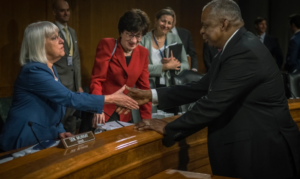
The Senate Appropriations Committee has approved marking up to an $823.3 billion Pentagon topline for fiscal year 2024, with senior lawmakers signaling further interest in potential supplemental spending measures to boost defense dollars above the cap set by the debt ceiling agreement. The panel on Thursday voted along party lines to agree on topline figures for the full slate of FY ‘24 spending bills, setting an $886 billion figure for total national defense spending. “We can and we absolutely should…

 By
By 











